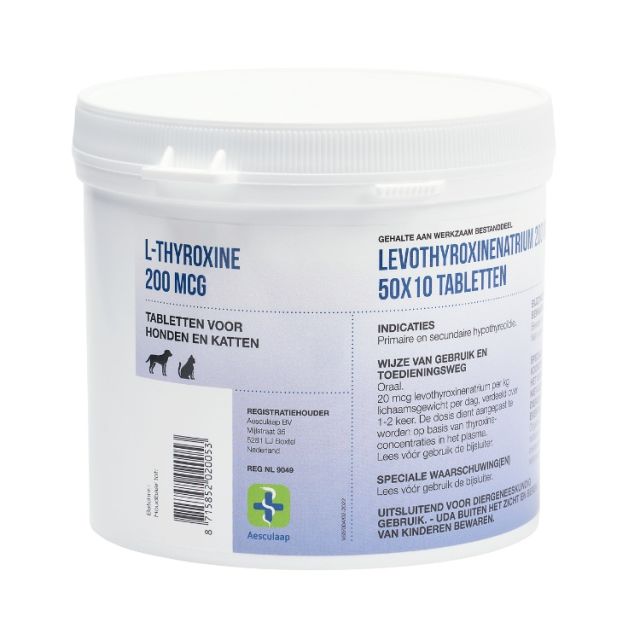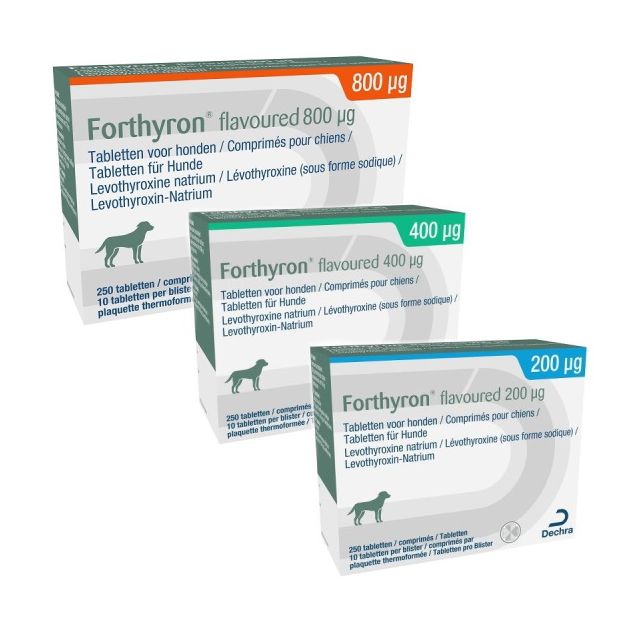Thyroid of the dog
Thyroid problems are common in dogs. By far the most diagnosed thyroid disorder is an underactive thyroid, also known as hypothyroidism. An overactive thyroid is much less common. In cats, however, hyperthyroidism is often seen. Occasionally, thyroid tumors also occur, sometimes leading to accelerated thyroid function. Pharmacy4pets helps you recognize thyroid problems in your dog.
The Dog's Thyroid
The thyroid is located in the neck, close to the trachea. Actually, the term 'thyroid' is incorrect, as it refers to two small organs, located on the left and right side of the trachea, the thyroid glands. These glands produce thyroid hormones. These hormones are very important for metabolism, and a deficiency (or excess) of them affects nearly all other organs.
Hypothyroidism in Dogs
The most common cause of an underactive thyroid, or hypothyroidism, is an inflammation of the organ: the body itself attacks the thyroid. Also, the thyroid can become smaller without a clear reason. The result is that too few thyroid hormones are produced.
Symptoms of Hypothyroidism in Dogs
The symptoms of an underactive thyroid are not always specific and can also be caused by other conditions. Common symptoms of hypothyroidism are:
- Lethargy.
- Stiffness.
- Preferring to lie in warm places.
- Weight gain without eating more.
- Thinner coat or bald spots, usually without itching.
- Thickened skin.
- Slow heart rate.
- Diarrhea.
- Weakness, staggering, collapsing.
- Failure to go into heat.
- False pregnancy.
Diagnosing Hypothyroidism in Dogs
The diagnosis of hypothyroidism is not always easy to make. In hypothyroidism, the amount of thyroid hormone in the blood decreases. However, it can also decrease due to many other conditions, which could lead to a mistaken belief that the dog has hypothyroidism. Therefore, the hormone that controls the thyroid, TSH, must also be determined. The blood level of TSH is higher in hypothyroidism. In addition, the symptoms must fit the clinical picture.
Treatment and Prognosis of Hypothyroidism in Dogs
An underactive thyroid can be treated with thyroid hormones. The lethargy should disappear within two weeks. Skin problems often take longer to fully recover, but most dogs are fully recovered within three months. However, it is recommended to find the correct dosage of thyroid medication with blood tests (four to eight weeks after starting treatment).
Because the treatment of hypothyroidism is lifelong, it is really important that the diagnosis is correctly made and the whole picture fits: so both appropriate complaints and a reduced level of thyroid hormone, an increased level of TSH, and the disappearance of symptoms during treatment. It would be a shame if your dog unnecessarily receives lifelong thyroid medication with the associated costs.
Thyroid Tumors in Dogs
Thyroid tumors are mostly found in older dogs. Usually, the thyroid tumor is easy to feel in the neck. Thyroid tumors are mostly malignant and can spread to the lymph nodes and the lungs. The tumors are often only on one side and usually do not produce hormones. Often, the only symptom is a thickness in the neck. If the tumor damages surrounding tissues, it can cause shortness of breath, coughing, poor appetite, weight loss, swallowing problems, or neck pain.
If the thyroid tumor does produce hormones, increased drinking and urination, weight loss despite a good appetite, panting, and fatigue are often noticed. Sometimes dogs with an accelerated thyroid also suffer from diarrhea and restlessness. The treatment of a thyroid tumor often consists of a combination of surgery and treatment with radioactive iodine.
Hyperthyroidism in Dogs
An overactive thyroid is rarely seen in dogs. Usually, the cause is a tumor of the thyroid. It is also sometimes observed in dogs that eat raw meat, specifically necks containing thyroid tissue from, for example, cows or horses. Obviously, normalizing the diet in this latter case is the solution.
Fortunately, most thyroid problems are treatable. If you have a question about our products or about thyroid problems in dogs, please contact us.



